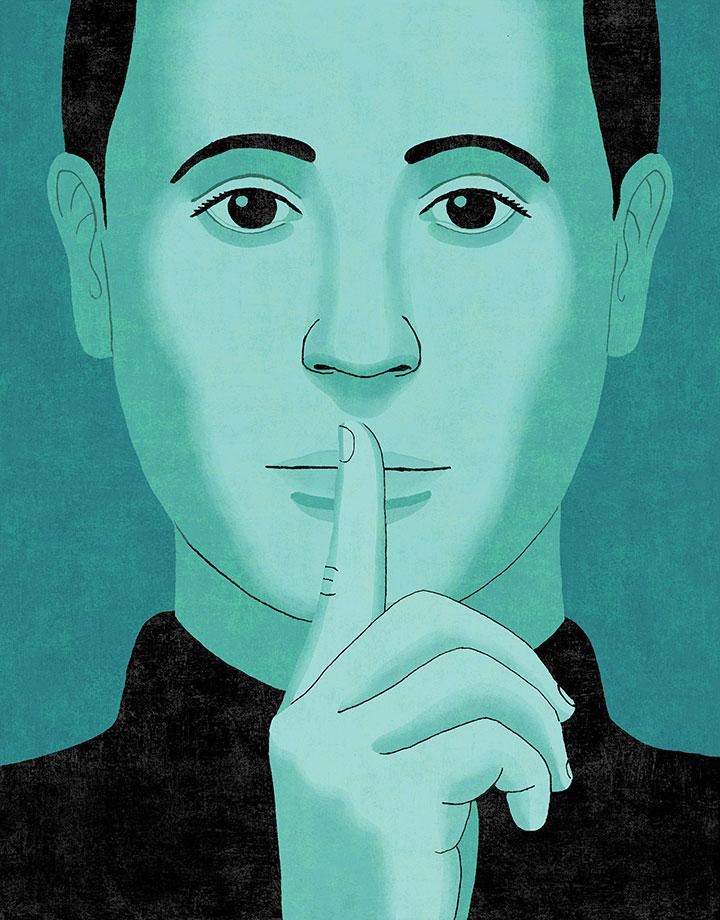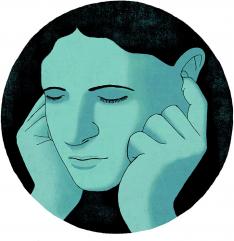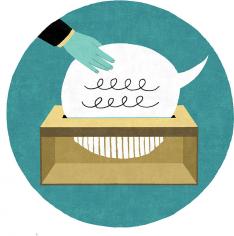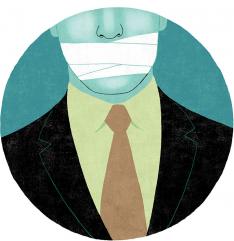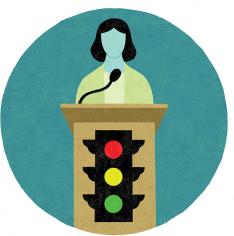Princetonians are questioning whether there are boundaries for campus conversations — and who draws the lines
It may seem strange that with street protests raging around the country over the shootings of unarmed black men at the hands of the police, what roused the Princeton campus to racially charged debate last spring was a bunch of jocks in fake loincloths, painted vaguely as tribesmen, banging on makeshift drums. Yet it was also the national climate that helped turn the strange “Urban Congo” performance, by members of the swimming and diving team, into an incendiary event that set off debates over the limits regarding free expression and freedom of speech at Princeton: Are there, in fact, limits on what can be performed, spoken, or argued on campus? If so, where is that line, and who draws the boundaries?
Many students decried the Urban Congo event, with its strange, quasi-African, quasi-Tarzan vibe, as insensitive to people who actually have recent roots in Africa. Others retorted — in columns in The Daily Princetonian as well as on anonymous online forums — that these students were making a big deal of a goofy skit by performers who were, at worst, tone-deaf.
When President Christopher Eisgruber ’83 invited the campus to a discussion at the University Chapel in early April about issues inspired by Urban Congo and a concurrent controversy — should the rapper Big Sean be disinvited from performing at Lawnparties because of misogynistic lyrics? — he strived to balance the ideals of freedom and sensitivity. After noting in the invitation that the president of Urban Congo had himself called the performance “inexcusably offensive,” Eisgruber wrote: “Comedy, satire, and stage performances inevitably transgress boundaries. The controversies they provoke may be genuinely painful, but they are also fundamental to the life of any great University.”
In the eyes of some students, he failed the balancing act. Several members of the Black Justice League, a student group formed after the killing of Michael Brown by police in Ferguson, Mo., read a manifesto at the Chapel meeting that included: “Freedom of speech is not a license for the verbal assault and hate speech that black students endure on this campus on a daily basis.”
Not just at Princeton but at college campuses nationally, a debate is underway about free speech and its discontents. This fall, students at Wesleyan sought to defund the campus newspaper after it published an opinion piece by a student skeptical of some aspects of the Black Lives Matter movement. In The New York Times, journalist and critic Judith Shulevitz argued that students are striving to shield themselves from “scary” ideas. At Brown University, she noted, some students had responded to the presence on a panel of a libertarian woman who argued that the notion of “rape culture” was overblown, by creating a “safe space”: a room with cookies, coloring books, pillows, and other comforting items — plus counselors — for students who might be traumatized by the speaker’s remarks. In The New Yorker, a Harvard law professor wrote that criminal-law professors across the country are dropping discussions of rape law because some students claim such discussions can be traumatic “triggers” for rape victims.
Harvey A. Silverglate ’64, a co-founder and chairman of the Foundation for Individual Rights in Education, or FIRE, sees an alarming nationwide trend. “For the first time in my adult life, I can honestly say that free speech is less available on college campuses than in what you might call ‘the real world,’” Silverglate says. “Even though speech in the real world has gotten better, campuses have taken a radical course of their own toward censorship.” FIRE gives Princeton’s code of conduct a failing grade because, the group argues, it defines harassment in ways that could be interpreted to encompass offensive speech protected by the First Amendment.
Nonetheless, Silverglate believes Princeton has preserved an open forum of ideas better than its peers, an opinion echoed by others. He cheered, for instance, when the Princeton faculty endorsed, in April, a statement on freedom of speech that included the right to voice views even if most or all of the community considered those views “offensive, unwise, immoral, or wrong-headed.”
Some professors and students argue, however, that the rhetoric of free-speech absolutism is disconnected from the reality of living in a community like Princeton. “There are absolutely ways in which we can’t say anything we want to say,” asserts Carolyn Rouse, a professor of anthropology. “As an anthropologist,” she adds, “I think a lot about culture. We have this ideal about free speech, but in most cultures you also have notions of civility, notions of taboo — what you can and can’t do.”
In day-to-day life, as opposed to in Supreme Court briefs, “you need to figure out what the boundaries are, what the taboos are,” Rouse says. “So we push the boundaries, and the boundaries change, and we’re in a new place. That’s all part of an ongoing debate about what constitutes civil speech.” That’s the dynamic she saw playing out last spring.
Eddie S. Glaude Jr. *97, chair of the Department of African American Studies, makes a similar point about the difference between abstract ideals and lived experience. “Ideally, the overriding value of universities is free and unfettered exchange of ideas,” he says. “But that’s not to say that there aren’t constraints on the nature of that exchange. There is a presumption of civility, even if that presumption is not rigid or binding. There is an assumption that people are accorded dignity and standing.”
Some of the topics being argued about have been causing uproars on campuses since at least the late ’80s — remember Dinesh D’Souza’s Illiberal Education? — but there are new developments. One is a focus on “microaggressions,” a term coined in the 1970s by a Harvard Medical School professor but only recently popularized. Microaggressions have been defined as slights by often well-meaning but unaware people that trivialize the struggles of minority groups. The academic author of one key article on microaggressions includes on a list of examples obvious gaffes like “You don’t sound black” but also more debatable examples, including “America is a melting pot,” which is said to denigrate people who wish to maintain their ethnic heritage. Princeton students sporadically have maintained a Facebook page called Tiger Microaggressions, cataloging slights that, at least in some cases, not all students agree are slights.
Another new development is the increasing anonymous debate through online platforms and commenting. When the Founding Fathers drafted the First Amendment, they could not have foreseen Yik Yak, an anonymous forum that played a large role in last spring’s controversy. Both sides of the Urban Congo debate used it to trade bite-sized arguments and put-downs.
At public universities, students possess all the rights under the Supreme Court’s interpretation of the First Amendment: Neo-Nazis are permitted to distribute pamphlets and make speeches, and only direct and narrowly targeted incitements to violence can be banned (along with a few other categories of speech). But those rights are not always enforced in practice. Last academic year, when a video surfaced of Sigma Alpha Epsilon members at the University of Oklahoma singing a racist song, the university’s president shut down the fraternity and expelled two students. (Several commentators said the university had made itself vulnerable to a First Amendment lawsuit, but none came.) At the University of Maryland, when a flagrantly racist and sexist email by a fraternity brother was exposed, the university made a different decision, concluding that this was protected speech.
As a private entity, Princeton has considerable leeway to restrict speech. The faculty pronouncement on free speech amounts to a commitment not to do that, but other University documents may point in a different direction. To free-speech activists, the anti-harassment policy fails to adequately make clear where the line falls between possessing and expressing racially or sexually insensitive views (permissible) and harassment (punishable). An “FAQ” on Princeton’s website suggests that, depending on their severity, microaggressions can fall under the University’s anti-harassment policies. The University has offered training sessions to help faculty and staff identify microaggressions and understand how they can make students feel unwelcome.
From one perspective, you could say that the marketplace of ideas resolved the Urban Congo controversy, just as John Stuart Mill might have wanted. Some people blasted the group, others defended it, the group apologized and disbanded. (The other controversy, involving the rapper Big Sean, basically fizzled.) But Glaude suggests that the Urban Congo incident showed that the marketplace of ideas doesn’t always work without outside intervention like a nudge from activists: “There was institutional involvement in that there was a meeting called of the community,” he says. “There were protests. There were concerns that some things had been broken that needed to be repaired, in terms of the ethos of our community. It did not resolve itself by a simple retraction.”
There remains an underlying sense that the rules of free speech are rigged against some populations. “The majority defines freedom of speech as meaning they get freedom of speech and not anyone else,” says Asanni York ’17, a Woodrow Wilson School major and member of the Black Justice League.
“When people in the minority speak their truths, when they point out what they deem to be oppressive, things get turned on them,” he adds. “They risk their livelihood and well-being.” In the Urban Congo case, it was the arguments that the performance was offensive that were characterized as violating an unspoken speech code, he says. In the midst of the controversy, one student posted on Facebook: “To the PC police and all other butthurt parties — the rest of the world is not here to cater to you.” To which a black student replied: “Why I feel unsafe @Princeton.”
Like some other students, York has a relatively expansive view of hate speech: “A lot of people think hate speech means statements like, ‘I want to kill you because you are ... ’ — and here you insert race, or gender, or another personal quality,” he says. “But I think the term encompasses more than that. Being told that if you are upset with the status quo, you can leave — knowing that the status quo is oppressive — that is a form of hate speech that a lot of black students at Princeton are familiar with.” (York also has experienced the more direct form of hate speech: During an angry dispute at a party at Princeton, he says, he was called a “nigger.”) Of the Urban Congo case, he says: “I do think it was unfortunate for President Eisgruber to use freedom of speech as a kind of blanket term to let students off the hook for being racist.”
On many campuses, it is often conservatives who argue that their views are considered outside the bounds of respectable thought. Tal Fortgang ’17 has felt a touch of that ostracism. “I have a lot of offensive opinions,” he says, almost cheerfully. Fortgang wrote a much-noted piece in April 2014, for The Princeton Tory, protesting students’ use of the phrase “check your privilege” to “strike down opinions without regard for their merits” because the speaker is white, or male, or both. Such identity-based attacks, he says, are deployed only against people with right-of-center views: the “wrong” views. Off campus, he says, it would be unremarkable to suggest that one contributing factor in poverty — in addition to racism and other structural forces — might be patterns of behavior by the poor themselves. But say that at a Princeton lunch table and “all hell breaks loose,” he says.
Fortgang’s views on free speech have evolved since he wrote the Princeton Tory piece. “I really think there is a distinction that has to be made between banning speech and discouraging certain kinds of speech,” he says. “All of us Americans have the right to speak our minds. But I don’t really think that discouraging particular kinds of speech is the worst thing in the world.” Still, he stands by what he wrote: “The principle of categorically rejecting what people have to say based on how people have been born is the same prejudice that leads us down some unspeakable roads.”
Not everyone feels pressure to hide unpopular views. Robert P. George, a politics professor for 30 years, director of the James Madison Program in American Ideals and Institutions, and an outspoken social conservative, has argued — to mention just one hot-button issue — that laws limiting marriage to one man and one woman are grounded in sound reason, not irrational prejudice. Yet, George says, “I have never had the experience of being shouted down or not permitted to speak. I have been able to speak my mind freely — but more than that, my students and faculty members have done me the honor of engaging me.”
“Reasons and arguments, I think, are the currency of academic discourse, and all should be prepared to do business with someone who is prepared to give reasons and arguments,” George says. “People will ask, ‘Don’t there have to be some limits? Would you entertain the speech of a Nazi or of a white supremacist?’ I don’t think the University necessarily has to entertain abuse and profanity, but if someone comes along and has a view that I abominate and think is evil, but is willing to give reasons and arguments, I think it is valuable for me to listen and engage.”
That view of engagement is not universal. Glaude, for instance, says he would have nothing to do with Charles Murray, the author of The Bell Curve, the 1994 book that argued that black Americans have lower IQs than white Americans and that this purported fact helped to explain socio-economic inequality. “I can disagree with someone on affirmative-action policy, but I couldn’t stomach someone making a case that I was intellectually inferior, no matter what the sophistication of the statistical derivations,” Glaude says.
He would not seek to ban Murray. But the only sensible response to an argument like Murray’s would be a terse profanity, Glaude says, so he would prefer not to engage.
Some students, however, would entertain the idea of banning people with views like Murray’s. Destiny Crockett ’17, an English major getting a certificate in African American studies, notes that, in 1973, a Harvard Law School group invited — then disinvited under pressure — William Shockley, a Nobel Prize-winning Stanford engineer who had become a zealous proponent of the idea that blacks were mentally inferior to whites. Princeton’s Whig-Cliosophic Society then agreed to host a debate between Shockley and Roy Innis, director of the Congress of Racial Equality. Crockett thinks Harvard made the right call, Princeton the wrong one.
In fact, Crockett says, there was something very much like a Shockley speech on the campus just last year. She means a debate about diversity at Princeton, in December 2014, that included Russell K. Nieli *79, a senior preceptor in the James Madison Program. The topic of that discussion, moderated by bioethics professor Peter Singer and including President Eisgruber, Woodrow Wilson School Dean Cecilia Rouse, sociologist Alexandria Walton Radford *09, and Nieli, was: “What Kind of Diversity: Is Princeton Too Narrowly Focused on Race and Ethnicity Rather than Economic Diversity?” Nieli made familiar arguments: that “diversity” was basically a code for enrolling a certain proportion of black students; that affirmative action harmed race relations by causing white and Asian students to assume black students could not get into Princeton without an artificial boost; and that the practice taught black students that they always would be held to lower standards than whites. Preferential admissions for athletes produced similar stereotypes, he said.
In an unusual form of silent protest, a group of students waved pamphlets marked with blue Post-Its whenever someone — usually Nieli — made a point they disagreed with. Nieli says, “They were protesting the very existence of this debate.”
Crockett, who helped plan the protest but couldn’t attend, affirms that interpretation: “We don’t think it should have been allowed. And we think that if it was allowed, there should have been a statement noting that President Eisgruber does not agree, and that he believes that black students should feel safe on campus.”
“One thing President Eisgruber is right about is that the role of a university is to allow the exchange of scholarly ideas,” she says. “But saying things like ‘Black students are only here because of affirmative action’ is not scholarly thought, because it is mired in the false stereotypes that black people are dumb and lazy.”
Singer, the moderator, did not find the protest threatening to free-speech values. “I thought the use of the cards was in itself an exercise of free speech,” he says by email, “and preferable to more vocal expressions of opposition that could have disrupted the event to a far greater extent.”
What about the nuclear option — shutting down a debate or a speaker? Glaude says he can imagine situations in which it might be appropriate — “to create the conditions for a broader conversation,” he says. “If someone brought neo-Nazis here, and students shut it down, that would make sense to me. If David Duke came here to make the argument for white power in the sanitized way in which he makes it, I see no problem in students engaging in an action to shut it down.”
Historically speaking, if students had never protested in such a manner, “I wouldn’t be a professor at Princeton,” he says. “The University would have stayed the same, as an insulated, predominantly male, white heterosexual space.” That such protests are less likely to occur at Princeton than at Berkeley or Brown speaks to “the culture of the place” — genteel politesse — not to an exceptional commitment to free speech, he says. Indeed, such protests “are a part of the American tradition.”
The idea that certain types of speech directly affect students’ safety is another new twist in today’s free-speech discussions. In debates last spring and in interviews with students, the word “safe” comes up frequently. Asked to clarify if she means literal physical safety or some kind of metaphorical safety, Crockett says: “In some ways I do mean physical safety. A friend of mine heard a group of white guys, at night on campus, saying the N-word. She didn’t feel comfortable confronting them about it. It was dark, at a time when there was so much violence in the country against black bodies.”
But there is also a different kind of safety, she says: “If your professor doesn’t think that you should be at Princeton, or thinks that you are inherently lazy, that’s not necessarily someone you want determining your grade — I would feel unsafe in that situation.” At Wesleyan, the editors of the student newspaper, the Argus, apologized for “the distress” its Black Lives Matter piece “caused the student body,” recommitting the paper to being “a safe space for the student-of-color community.” (Wesleyan’s president, Michael Roth *84, seemed less apologetic in a three-paragraph statement defending the newspaper: “Debates can raise intense emotions, but that doesn’t mean that we should demand ideological conformity because people are made uncomfortable. As members of a university community, we always have the right to respond with our own opinions, but there is no right not to be offended.”)
Hannah Rosenthal ’15 has experience in both fostering debate among students and discussing the limits of debate. As a junior, she founded Club Nom — “nom” is slang for eating — which sponsored discussions in the eating clubs for members and non-members. Among the discussions she brokered was one about whether certain kinds of speech should be limited. She says she is not qualified — “as a white person” — to judge what kind of statements might make a minority student at Princeton feel unsafe, but she is sympathetic to the testimony of her peers who say that is their experience. “The word ‘safety’ is deliberately used,” Rosenthal says. “It’s not a question of comfort, it’s a question of not being targeted. When your safety is weighed against someone else’s academic freedom, it seems like a clear answer to me.”
Nieli sees unsettling implications in the line of argument that equates intellectual discomfort with physical harm, not to mention inconsistencies. “Some people on the left believe that they have a right not to be offended, and offense-takers have a veto power over those who offended them,” he says. “But it’s not everyone who can make these claims. The InterVarsity Christian Fellowship can’t complain if someone says something to offend them. Football players can’t complain if they are offended. It’s mainly feminists and black groups.”
Yet the specific history of oppression and exclusion experienced by black students and members of other minority groups makes that comparison a false one, says Rouse, the anthropologist. Athletes and Christians are unlikely to feel the same sting in insinuations that fewer of them belong on the campus.
Issues of student safety and anonymous speech came together during the Urban Congo controversy last spring, when students mocked student protesters on social media and mentioned them by their initials, which some found intimidating. Michele Minter, vice provost for institutional equity and diversity, emailed students that such behavior “has no place in our community,” and her office is sponsoring an initiative called “Own Your Words,” encouraging students to conduct debates in spaces where they can look their opponents and interlocutors in the eyes.
As president of Colgate University from 2010 to June 2015, Jeffrey Herbst ’83, a former Princeton professor, faced protests from minority students, including a sit-in in the main administration building last year. (He says he largely sympathized with the goals of the protesters, if not every tactic.) Now president and CEO of the Newseum, in Washington, D.C. — dedicated to the press and the First Amendment — he says he views posting anonymous comments as antithetical to the spirit of a university community. But he also is insistent that Princeton, as a private university, should not create a different standard for free speech than exists at public universities. “That would do the students a disservice,” he says. “Part of what colleges and universities should be about is preparing people to enter that raucous and complicated public square.”
So far, students and professors say they have not seen unpopular views shut down in class. “Trigger warnings” — advance notice to students before they are exposed to discussions about, or literary representations of, subjects like rape, abuse, or racism — have not been part of Princeton classes, several told PAW. But one humanities professor, who asked not to be named, said the concerns underlying trigger warnings, and the attendant vocabulary, increasingly were “part of the culture here.” He teaches modern works that sometimes deal with difficult social issues. “Most of the time, in the past, when I’ve been challenged by students over content on my syllabus it’s been on the angle of ‘obscenity,’ or a religious objection,” he says. But today, he says, those who object speak in terms of the possible infliction of “some version of trauma.”
Already, Carolyn Rouse, the anthropology professor, worries that restrictions on speech, whether self-imposed or otherwise, are having an impact, causing students on both the left and the right to fail to develop their debating skills. Students, she says, are failing to engage each other as the result of apathy, or fear of giving offense, or fear of being offended, or because it’s just more fun to post “clever” one-liners to Yik Yak. “As an academic institution, we can do better,” she says. “If you are right-wing, you’d better be able to debate, on facts, students who are progressive. If you are progressive, you’d better be able to debate, on facts, this person who is conservative — and not just spew emotionally on anonymous social media.”
Though a great proponent of civility and respect, Rouse dislikes “this sort of centrist ‘let’s all get along’ ethic,” believing instead that students must learn to engage their ideological adversaries. “We don’t all think the same thing. We never will all think the same thing,” she says.
“The question is: How do we talk to each other so that we can understand where each other is coming from?”
Christopher Shea ’91 has written for The New York Times Magazine,The Wall Street Journal, and other publications.

